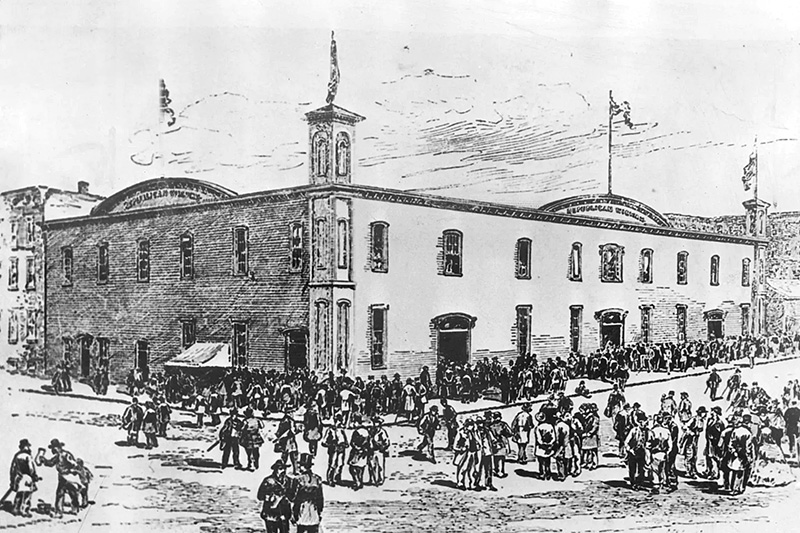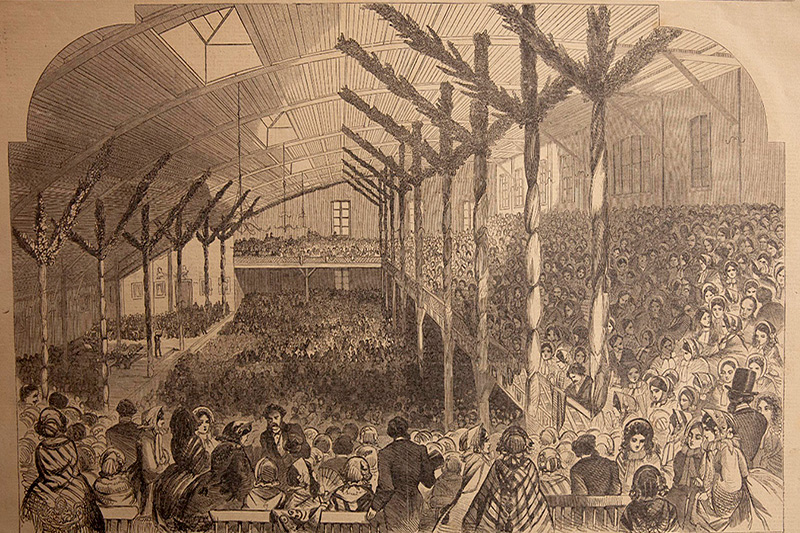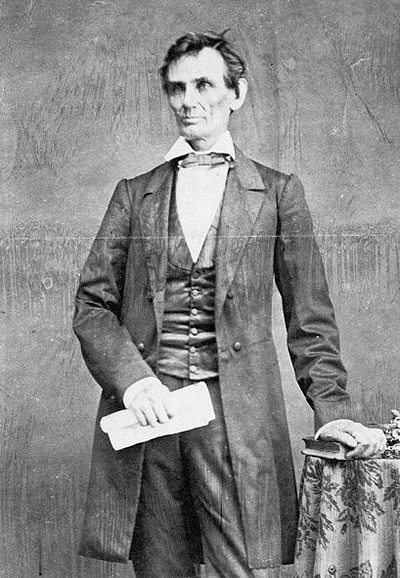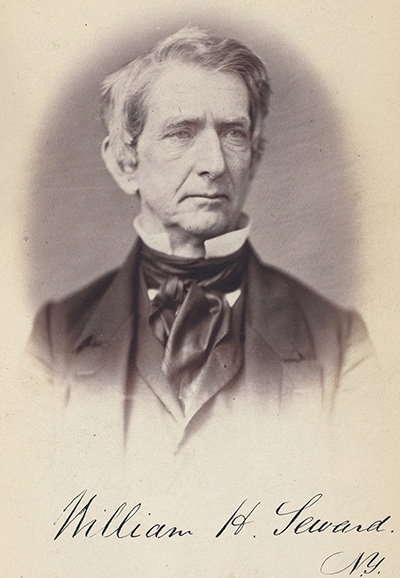How Lincoln Won the 1860 Republican Nomination
By Gordon Leidner — Great American History
One of the most interesting American political stories involves the nomination of Abraham Lincoln to be the Republican party’s candidate for President of the United States in 1860. This was the Republican party’s second presidential convention, and the man everyone expected to receive the nomination was the powerful and well-known William H. Seward of New York.
Abraham Lincoln, although having recently been introduced to eastern audiences through a series of political speeches in New England, and prior to that having gained some fame due to his participation in “the Great Debates” with Stephen A. Douglas, was not considered a serious contender for the appointment. How he and his political team brought him from “dark horse” contender to the victor is the subject of the following article.
Abraham Lincoln, although having recently been introduced to eastern audiences through a series of political speeches in New England, and prior to that having gained some fame due to his participation in “the Great Debates” with Stephen A. Douglas, was not considered a serious contender for the appointment. How he and his political team brought him from “dark horse” contender to the victor is the subject of the following article.
The following story appeared on The Washington Times Civil War page Saturday, August 10, 1996. Copyright 1996 by the Washington Times. Used with permission.


Exterior and interior views of “The Wigwam,” home to the 1860 Republican nominating Convention in Chicago, Illinois
Lincoln Outfoxed Seward for the Nomination
In May 1860, the nation’s attention turned toward Chicago, where the Republicans were meeting to select their presidential candidate.
William H. Seward, the Republican front-runner from New York, sent his political team to Chicago to lock up his party’s nomination. In the mid-nineteenth century, it was not considered proper for the aspiring candidate to go to the convention himself, so Seward sent his political manager, Thurlow Weed, along with his states’ 70 delegates and 13 railroad cars of supporters.
The residents of Chicago were delighted to have their city of 100,000 chosen for the Republican party’s second presidential convention. At the cost of about $6,000, Republicans there built a new convention center for the occasion. Nicknamed “The Wigwam,” it had excellent acoustics and could seat more than 10,000, which purportedly would be the largest audience yet assembled in the country under one roof.
William H. Seward, the Republican front-runner from New York, sent his political team to Chicago to lock up his party’s nomination. In the mid-nineteenth century, it was not considered proper for the aspiring candidate to go to the convention himself, so Seward sent his political manager, Thurlow Weed, along with his states’ 70 delegates and 13 railroad cars of supporters.
The residents of Chicago were delighted to have their city of 100,000 chosen for the Republican party’s second presidential convention. At the cost of about $6,000, Republicans there built a new convention center for the occasion. Nicknamed “The Wigwam,” it had excellent acoustics and could seat more than 10,000, which purportedly would be the largest audience yet assembled in the country under one roof.
The Candidates
Seward and Weed–some would say the unscrupulous Weed–were confident. It would take 233 votes to win the nomination, and they had nearly a third of that in the New York delegation alone.
Who could possibly upset their plans? Not Pennsylvania’s candidate, Simon Cameron. Cameron was considered a crook by most of the country, and would have little support outside of the 54 delegates from Pennsylvania. Not Ohio’s Salmon P. Chase. Ohio’s 46 votes probably would be split between he and fellow Ohioans Sen. Ben Wade and Judge John McClean. Not Missouri’s Edwin Bates–although Bates had Missouri’s 18 delegates and the backing of the nation’s most powerful newspaper editor, Horace Greely of the New York Tribune.
Seward and Weed recognized that they were not on their own turf, and anticipated that Illinois’ “Favorite Son,” Abraham Lincoln, probably would receive all of the states’ 22 votes. Since Illinois was considered a doubtful state for candidate Seward should he be the Republican candidate (where he would have a tough time defeating the anticipated Democratic nominee–Illinois’ other favorite son, Stephen A. Douglas), Weed was prepared to acquire Illinois votes on the second ballot by offering Lincoln the vice-presidential spot.
That should secure Seward’s nomination in the event of a tough floor fight, he and his supporters reckoned.
Who could possibly upset their plans? Not Pennsylvania’s candidate, Simon Cameron. Cameron was considered a crook by most of the country, and would have little support outside of the 54 delegates from Pennsylvania. Not Ohio’s Salmon P. Chase. Ohio’s 46 votes probably would be split between he and fellow Ohioans Sen. Ben Wade and Judge John McClean. Not Missouri’s Edwin Bates–although Bates had Missouri’s 18 delegates and the backing of the nation’s most powerful newspaper editor, Horace Greely of the New York Tribune.
Seward and Weed recognized that they were not on their own turf, and anticipated that Illinois’ “Favorite Son,” Abraham Lincoln, probably would receive all of the states’ 22 votes. Since Illinois was considered a doubtful state for candidate Seward should he be the Republican candidate (where he would have a tough time defeating the anticipated Democratic nominee–Illinois’ other favorite son, Stephen A. Douglas), Weed was prepared to acquire Illinois votes on the second ballot by offering Lincoln the vice-presidential spot.
That should secure Seward’s nomination in the event of a tough floor fight, he and his supporters reckoned.


Lincoln's Strategy
Lincoln had been busy preparing for the convention as well. Using all his political skill, he had persuaded the Illinois delegation to vote for him in a bloc. To lead the floor fight, he selected David Davis, a trusted friend, and Norman Judd, who was due most of the credit for bringing the Republican convention to Chicago. Finally, he provided them with some tactical guidance and limitations of engagement, which included an admonishment to “make no deals that bind me,” and waited in Springfield for the results.
Confident that Seward would not have enough votes to lock up the nomination on the first ballot, Lincoln intended to get the second highest vote count on the first ballot and line up additional votes for the second ballot in order to show increasing strength. He hoped that this strategy–combined with the presence of an enthusiastic band of followers on the floor–would be sufficient to win the nomination on the third or subsequent ballot.
Lincoln’s men left no detail unattended in their pursuit of this strategy. They made certain that Seward’s New Yorkers were seated far from other critical delegations with whom they might collaborate. They printed hundreds of counterfeit tickets and distributed them to Lincoln supporters with instructions to show up early–in order to displace Seward’s supporters.
They also assigned two men with noted stentorian voices to lead the cheering. One of these men reportedly had a larynx powerful enough to allow his shout to be heard across Lake Michigan.
Confident that Seward would not have enough votes to lock up the nomination on the first ballot, Lincoln intended to get the second highest vote count on the first ballot and line up additional votes for the second ballot in order to show increasing strength. He hoped that this strategy–combined with the presence of an enthusiastic band of followers on the floor–would be sufficient to win the nomination on the third or subsequent ballot.
Lincoln’s men left no detail unattended in their pursuit of this strategy. They made certain that Seward’s New Yorkers were seated far from other critical delegations with whom they might collaborate. They printed hundreds of counterfeit tickets and distributed them to Lincoln supporters with instructions to show up early–in order to displace Seward’s supporters.
They also assigned two men with noted stentorian voices to lead the cheering. One of these men reportedly had a larynx powerful enough to allow his shout to be heard across Lake Michigan.
Stop Seward
The first two days of the convention were devoted to acceptance of delegates, administration, and the platform. The evenings were spent in the caucusing of delegates. Weed’s approach was to offer champagne for the present and “oceans of money” for the future.
In contrast, Davis and Judd spent their time lining up votes from delegates of other states that didn’t want to see Seward win. Indiana committed 26 first ballot votes to Lincoln. Several of the New England states, including New Hampshire and Maine, provided Lincoln with many first ballot votes that Seward was planning on.
Even more important were the second ballot votes. Several states, including Vermont, were glad to find that the “stop Seward” forces were finally uniting behind one man and committed most of their subsequent votes to Lincoln.
Pennsylvania was harder to crack. Davis chose to ignore Lincoln’s direction about making pledges in his absence, and got a commitment from Pennsylvania to support Lincoln on the second ballot by offering a cabinet position to Simon Cameron.
In contrast, Davis and Judd spent their time lining up votes from delegates of other states that didn’t want to see Seward win. Indiana committed 26 first ballot votes to Lincoln. Several of the New England states, including New Hampshire and Maine, provided Lincoln with many first ballot votes that Seward was planning on.
Even more important were the second ballot votes. Several states, including Vermont, were glad to find that the “stop Seward” forces were finally uniting behind one man and committed most of their subsequent votes to Lincoln.
Pennsylvania was harder to crack. Davis chose to ignore Lincoln’s direction about making pledges in his absence, and got a commitment from Pennsylvania to support Lincoln on the second ballot by offering a cabinet position to Simon Cameron.
Beyond Description
Finally, the third day arrived. One thousand Seward men marched behind a smartly uniformed brass band. They wound their way noisily through Chicago’s streets, playing the song “Oh, Isn’t He a Darling?” and finally arrived triumphantly in front of the Wigwam. To their horror, they found that they could not get in: the Lincoln men, admitted with their counterfeit tickets, had taken their seats.
Still, Seward had his share of support. When his name was offered in nomination, tremendous applause went up from the audience–followed by louder applause for Lincoln. The crowd quickly recognized them as the front-runners when the other candidates received less enthusiastic commendation.
When Seward’s name was seconded, the demonstration was so vociferous that “hundreds of persons stopped their ears in pain.” But when Lincoln’s nomination was seconded, the uproar was “beyond description.”
Leonard Swett, a friend of Lincoln’s, said that “Five thousand people leaped to their seats, women not wanting, and the wild yell made vesper breathings of all that had preceded. A thousand steam whistles, ten acres of hotel gongs, a tribe of Comanches might have mingled in the scene unnoticed.”
Still, Seward had his share of support. When his name was offered in nomination, tremendous applause went up from the audience–followed by louder applause for Lincoln. The crowd quickly recognized them as the front-runners when the other candidates received less enthusiastic commendation.
When Seward’s name was seconded, the demonstration was so vociferous that “hundreds of persons stopped their ears in pain.” But when Lincoln’s nomination was seconded, the uproar was “beyond description.”
Leonard Swett, a friend of Lincoln’s, said that “Five thousand people leaped to their seats, women not wanting, and the wild yell made vesper breathings of all that had preceded. A thousand steam whistles, ten acres of hotel gongs, a tribe of Comanches might have mingled in the scene unnoticed.”
Holding Their Breath
After the first ballot, Seward, as expected, led with 173 votes. Lincoln was next with 102. Cameron received 50; Chase got 49; Bates 48; and the rest received a handful each.
A second ballot was immediately called for, and the Lincoln camp knew that their man would gain strength. Vermont was the first state to make a major shift–all 10 votes went to Lincoln, a significant blow to Seward. As the roll call continued, Lincoln gained a few votes here and a few there, while Seward’s tally remained largely unchanged.
When Pennsylvania’s turn came, the Lincoln men held their breath. Whereas only four votes from Pennsylvania went to Lincoln on the first ballot, a whopping 48 went to him on the second. Seward supporters sank in their seats. Lincoln clearly had the momentum. The final tally on the second ballot was 184 for Seward and 181 for Lincoln.
A second ballot was immediately called for, and the Lincoln camp knew that their man would gain strength. Vermont was the first state to make a major shift–all 10 votes went to Lincoln, a significant blow to Seward. As the roll call continued, Lincoln gained a few votes here and a few there, while Seward’s tally remained largely unchanged.
When Pennsylvania’s turn came, the Lincoln men held their breath. Whereas only four votes from Pennsylvania went to Lincoln on the first ballot, a whopping 48 went to him on the second. Seward supporters sank in their seats. Lincoln clearly had the momentum. The final tally on the second ballot was 184 for Seward and 181 for Lincoln.
A Hush Fell
Ballot three began. Lincoln continued to pick up votes–4 more from Kentucky, 15 from Ohio–while Seward lost votes. When the pencils stopped scratching, Lincoln had 231 and a half votes–one and a half short of those needed for the nomination.
A hush fell, and all eyes turned toward D. K. Cartter of Ohio, who stuttered out: “I-I arise, Mr. Chairman, to a-announce the ch-change of four votes, from Mr. Chase to Abraham Lincoln!” For a moment, the audience was silent–then it erupted. The sound was so deafening that the only way people could tell that cannons outside the Wigwam were being fired was by watching the smoke drift from the barrels.
A hush fell, and all eyes turned toward D. K. Cartter of Ohio, who stuttered out: “I-I arise, Mr. Chairman, to a-announce the ch-change of four votes, from Mr. Chase to Abraham Lincoln!” For a moment, the audience was silent–then it erupted. The sound was so deafening that the only way people could tell that cannons outside the Wigwam were being fired was by watching the smoke drift from the barrels.
Ironic Footnote
So Lincoln was nominated and would be elected the nation’s 16th president. He appointed Seward secretary of state, Cameron secretary of war, Chase secretary of the Treasury, and Bates attorney general.
Lincoln proved to be a better leader than Seward. For example, when the South seceded, Seward proposed that Lincoln evoke the Monroe Doctrine to justify a declaration of war on France and Spain–which he believed would cause the South to come to the North’s aid and re-join the Union. Lincoln ignored this foolishness. “The President is the best of us!” Seward would admit later.
There is an ironic footnote to the convention story: A few blocks from the Wigwam, on the second night of the convention, the McVicker’s Theater was opening “Our American Cousin” –the play Lincoln would be watching at Ford’s Theater his last night on Earth.
Lincoln proved to be a better leader than Seward. For example, when the South seceded, Seward proposed that Lincoln evoke the Monroe Doctrine to justify a declaration of war on France and Spain–which he believed would cause the South to come to the North’s aid and re-join the Union. Lincoln ignored this foolishness. “The President is the best of us!” Seward would admit later.
There is an ironic footnote to the convention story: A few blocks from the Wigwam, on the second night of the convention, the McVicker’s Theater was opening “Our American Cousin” –the play Lincoln would be watching at Ford’s Theater his last night on Earth.
References:
1. Lincoln’s Rise to Power by William Barringer
2. Lincoln by David Herbert Donald
3. Fire the Salute! Abe Lincoln is Nominated! Murat Halstead Reports the Republican National Convention edited by Paul M. Angle and Earl S. Miers
4. Lincoln and the Press by Robert S. Harper
5. Abraham Lincoln by Benjamin P. Thomas
Order: Harper’s Lincoln and the Press Now
1. Lincoln’s Rise to Power by William Barringer
2. Lincoln by David Herbert Donald
3. Fire the Salute! Abe Lincoln is Nominated! Murat Halstead Reports the Republican National Convention edited by Paul M. Angle and Earl S. Miers
4. Lincoln and the Press by Robert S. Harper
5. Abraham Lincoln by Benjamin P. Thomas
Order: Harper’s Lincoln and the Press Now